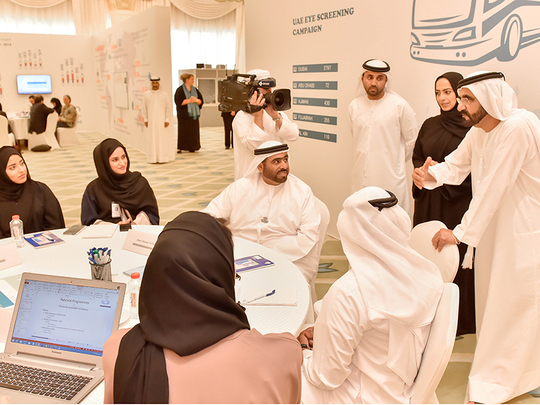
Dubai: The Noor Dubai Foundation, a Dubai-based non-governmental organisation, announced its target to reach 100 million people worldwide in its campaign to prevent blindness. The foundation, that signed an MoU with the Carter Foundation in 2013, entered into a three-year partnership to fight trachoma (that leads to blindness) in Ethiopia.
His Highness Shaikh Mohammad Bin Rashid Al Maktoum, Vice-President and Prime Minister of the UAE and Ruler of Dubai, attended the Noor Dubai Foundation’s brainstorming session held to formulate its five-year strategy on sustainable funding, among other things. The session was attended by four teams from the foundation as well as youth volunteers from the GCC, international speakers from various universities and banks and the Carter Centre.
Shaikh Mohammad spoke with different participants and listened to their ideas regarding topics being discussed, which revolved around four themes: the foundation’s international and national programmes for combating blindness, the media, the foundation’s corporate identity, in addition to investments and donations for the foundation.
Shaikh Mohammad also participated in a debate between speakers on the most successful methods for developing the foundation’s strategy for the next five years, and the capabilities to implement it in order to achieve the foundation’s objectives.
Shaikh Mohammad said that he relies on the fruitful ideas of youth, and urged them to harness their capabilities and talents to innovate in order to build a modern nation that is based on creativity and excellence, and creating opportunities for Emirati innovators and researchers.
Earlier in the morning, former US president Jimmy Carter and the chairman of the Noor Dubai Foundation, Eisa Al Maidour, were the keynote speakers at the event. The Carter Centre is partnering with Noor Dubai Foundation in prevention of blindness and other programmes such as combating communicable diseases.
When asked to evaluate the relationship that Carter Centre had with Noor Dubai Foundation, Carter told media persons: “(The relationship) has been very valuable, very promising and I hope mutually helpful. We have a learnt a lot from Noor Dubai and I think they have learnt some things with us, from our people in Ethiopia and Atlanta and we hope with our people in Uganda in the future. I think seeing how Noor Dubai makes its careful plans and how they reach out to many projects around the world will be very useful for the Carter Centre to emulate in the near future.”
Reiterated the foundation’s resolve to continue its efforts in preventing blindness, Al Maidour said: “We will continue conducting eye-saving surgeries, providing medication and conducting educational programmes to prevent blindness and with our five-year strategy we will take into consideration the most urgent needs of the global community to fight blindness.”
Recounting the challenges that the foundation has faced in setting up camps in villages across countries in Asia and Africa, Dr Manal Omran Taryam, Director of the Foundation, said that dispelling orthodox ideas and educating people was one of the major problems. “We have encountered a lot of challenges in providing our services to women in certain countries because of gender discrimination. In some countries there is a misconception that if a woman goes blind it is because of some black magic or evil and they lock the affected woman in a dark room and she is not allowed to mix with the rest of the family. In one Arab country we actually had a woman with cataract who refused to be treated because she was convinced she was touched by black magic. In fact a simple cataract removal would have immediately given her 20/20 vision, but we could not convince her.”
Dr Manal continued talking about the social and orthodox roadblocks they have faced and overcome in these years: “Even when a charity goes to provide free health care, women are not brought to the camp as people are afraid to let them out. In many cases men do not bother to bring their daughters, sisters, wives or mothers to the camp for surgery as they feel the woman does not contribute financially to the family.”
Dr Manal described how the foundation volunteers knocked on doors in villages to look for women in need of eye surgeries and brought them to the camp. She also talked about garnering local volunteers who understood the language and culture of their region to convince the local population to avail of the free treatment. “There were times when we had to deal with basic problems like lack of electricity or running water in setting up camps. One time in Somalia we were attacked by rebels. In Pakistan we faced floods and had to wrap up our operations earlier. It has been difficult but our perseverance has worked,” she added.











